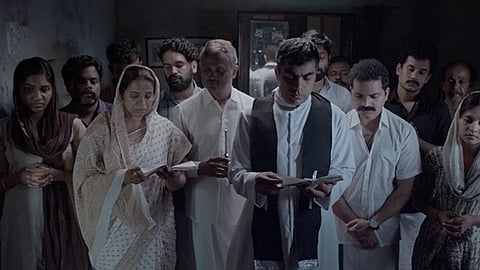Family review: Don Palathara’s chilling film lays bare how society protects predators
Family (Malayalam)(4 / 5)
In an Idukki hamlet, two predators are on the loose. One is a leopard lurking in the shadows, and stealing domestic animals one by one. Another is a young man whom everyone loves and welcomes into their homes. While the hamlet is united in its ambition to trap the leopard, they would rather not address the question of the beast that walks among them – maybe because he looks, behaves, thinks, and prays just like them.
Don Palathara’s Family (co-written with Sherin Chatherine) is an intricate portrait of a close-knit community where everyone knows everyone. The church looms large over the people, their social and personal lives governed by the institution. Among the god-fearing herd lives Sony (Vinay Forrt), the hamlet’s Good Samaritan. Sony helps everyone, even a cow that’s fallen into a trap set for the leopard. He’s always thinking about how to improve the lives of those around him.
Vinay plays the role with an air of guileless openness. The unease he generates is masterful because it’s mostly through the staging of the scenes rather than violence or dialogue. In one scene, for instance, a father is blissfully watching TV in the foreground while Sony is teaching Maths to his daughter in the background. The daughter isn’t in the frame, only the father and Sony are. Then, Sony gets up and moves to where the daughter must be. It’s his absence that strikes terror in the viewer because we know what he must be doing – and the imagination of the scene is far more terrifying than what a filmmaker could possibly show.
In another scene, Sony is lying next to a boy on the bed. He doesn’t touch the child or say anything inappropriate. In fact, he’s offering him life advice. Yet, the response of the boy tells us all we need to know about the relationship between them. In that sense, Family is also an educational film – not didactic, most certainly not – but a visual representation of what abuse actually looks like and how it happens. That it could happen in silence, with people in the next room, and that the victim could even miss the attention if it’s suddenly withheld from them. This is in sharp contrast to how abuse is usually depicted on screen, with loud screams, torn clothes, and shattered victims weeping at the camera.
Family’s villain is one among the people, in the theatre conjured up by home, society, and religion. Going against the norms earns punishment while conforming reaps rewards. Everybody has to perform their respective roles, and it is in the unsaid that the artifice lies exposed. In a brilliantly shot scene, Sony is confessing to the priest. He says the usual things and receives the usual responses. As the priest is talking, Sony briefly glances at his watch, slightly bored and indicating that he can’t wait for the confession to get over. He receives his pardon for sins he has no plans of admitting to, not even to himself.
More chilling than Sony’s predatory behaviour, however, is how smoothly his secret is protected by those around him. You wait for the moment of discovery, the explosion that you’re sure it will set off. But, that’s not where the film takes us. The static shots build tension within the viewer, and it is also perhaps indicative of how the characters will respond to what they’re hearing. They’d rather not disturb the stillness of their community. There’s too much at stake and so, the lambs must be led to slaughter.
Slowly, we realise just how many victims have been drawn into this leopard’s lair. There is no background music to manipulate our emotions this way or that – and that makes this macabre world all the more realistic. The winding roads and gorgeous greenery turn menacing as we grasp the depth of the rot beneath.
Divya Prabha is excellent in her role as Rani, small as it might be. The actor, who delivered a sterling performance in Ariyippu (2022), functions as the barely-beating conscience of the hamlet. It’s through tiny flickers in her expression that the viewer’s hope rises and dies. Mathew Thomas is also commendable as Sony’s younger brother, effectively bringing out one dynamic in front of the family and another when it’s just the two of them.
The chilling ending of the film offers no respite to the viewer, but again, it is through the staging that Don conveys everything he wants to say. God is well and truly dead.
Disclaimer: This review was not paid for or commissioned by anyone associated with the film. Neither TNM nor any of its reviewers have any sort of business relationship with the film’s producers or any other members of its cast and crew.
Sowmya Rajendran writes on gender, culture, and cinema. She has written over 25 books, including a nonfiction book on gender for adolescents. She was awarded the Sahitya Akademi’s Bal Sahitya Puraskar for her novel Mayil Will Not Be Quiet in 2015.

